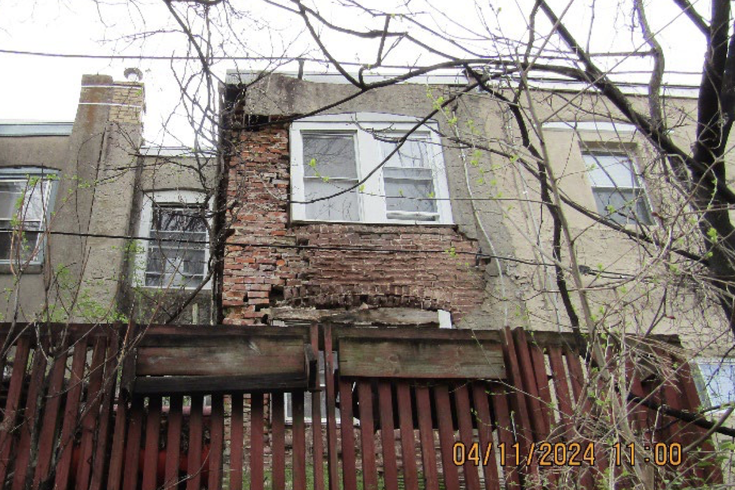
June 13, 2024
 Provided Image/Office of the Controller
Provided Image/Office of the Controller
Thousands of unsafe properties in Philadelphia are overwhelming the Department of Licenses & Inspections, a city controller's report found. The photo, included in the controllers audit, shows a crumbling portion of a home in the Belfield section of North Philly.
Philadelphia's Department of Licenses & Inspections lacks enough staff and money to carry out urgently needed demolitions and repairs at thousands of city properties, according to an audit released Wednesday by the Philadelphia City Controller Christy Brady.
About 4,000 properties in the city currently are classified as unsafe, including 120 that are imminently dangerous and need to be either demolished or undergo significant repairs. Management of these projects is led by L&I's Contractual Services Unit, which inspects dangerous properties and posts notices for owners to make repairs or obtain demolition permits.
On average, it costs the city $30,000 to demolish a two-story residence — that cost increases by about $12,000 for each additional floor — yet only about 3% of the cost is recovered from property owners, the report found. The rest is funded by taxpayers. The audit states that since 2019 — excluding 2020 — the city has recovered only $1.8 million of the $60 million it spent to demolish nearly 2,000 properties.
Apart from the cost of addressing unsafe properties, the report noted the 15 staff members in L&I's Contractual Services Unit are unable to keep up with the demand for inspections. Their jobs are often delayed by lengthy court proceedings, sometimes up to 90 days for cases that are appealed by property owners. This contributes to a backlog for follow-up inspections of imminently dangerous structures that are supposed to be monitored every 10 days.
The city has budgeted for 20 inspectors, but there is an 18-month certification process that extends the time it takes to onboard new hires in the unit.
The controller also found that L&I's tracking system for unsafe properties isn't streamlined to make it easier for staff to know about buildings that need to be inspected. When the controller's office conducted on-site inspections of imminently dangerous buildings, about 50 on the city's list did not have permits to either make repairs or move forward with demolition. The report described some as on the verge of collapse due to structural damage and missing roofs.
The audit is one of several that the controller's office has performed since the 2013 collapse of a building being demolished at 22nd and Market streets that killed six people and injured 14 others. Those liable for the collapse reached a $227 million settlement in 2017 with the survivors of the collapse and the families of the people who died.
After Mayor Cherelle Parker took office in January, one of her first actions was to split L&I into two offices with separate commissioners. One division is now tasked with inspections, safety and compliance while the other works to address "quality of life" issues in the city.
Basil Merenda, who oversees the inspections division, said Wednesday that she welcomes the report from the controller and that it builds on the findings of an L&I reform task force.
"Although there were issues and concerns with unsafe properties and demolitions, the task force did not have time then to drill down and investigate that specific aspect of L&I’s mission. We do now," Merenda said in an emailed statement.
The controller's report recommended that L&I create an active recruitment program to bring on more staff to handle inspections. It also called for the city to establish a better way to collect money owed by property owner for demolitions. Other recommendations include updating L&I's tracking system and working more closely with courts to reduce delays that hold back follow-up inspections.
Merenda said Parker has instructed L&I to study the controller's report and work on adopting its recommendations.
"Our mandate from the mayor is a safer city, in which dangerous and imminently dangerous buildings are closely scrutinized, and all appropriate actions are taken to safeguard the public," Merenda said.